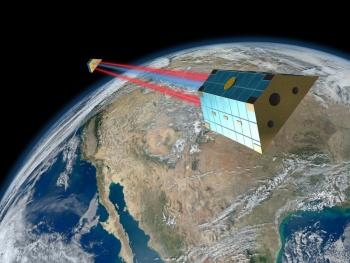University of Naples "Federico II"
University of Naples "Federico II"
Georgia Institute of Technology
University of Naples "Parthenope"
University of Naples "Federico II"
University of Naples "Federico II"
Autonomous System Laboratory (ETH), Zurich
Research Activities

Formation Geometries for cooperative navigation in GPS challenging environments
Status: on going
Navigation in GPS challening environment could be enhanced by father/son strategy that exploits both cooperative and visual aided navigation. It is assumed the son vehicle to fly inside a GNSS challenging environment. The father vehicle outside the GNSS challenging zone could estimate its position with high accuracy and send it to the son, that could improve its state estimation by using a visual device t identify the father. It is assumed father and son to be always in LOS. This study focuses on the definition of the best father/son geometry to improve son state estimation

Cooperative Planning for UAV Swarms
Status: on going
This project is focused on the path planning and task assignment of UAV swarms in GNSS denied environments. Father/Son strategy is used to improve the navigation state of the son during its flight in the denied zone. Father vehicle must be in line of sight with the son during the operation in the GNSS challenging area, remaining outside this area. Task assigment accounts to guarantee the required number of father is in LOS with the son, and accounts for father son synchronization

Cooperative Navigation of UAVs
Status: on going
Attitude and positioning estimation of UAV platforms can be enhanced with cooperative measurements. This study uses CDGPS and visual measurements in a TRIAD filter to improve the knowledge of UAVs attitude

GPS Baseline Determination
Status: completed
The flight of Satellites in Formation requires a precise relative positioning knowlegde. CDGPS filter are used for this purpose allowing to achieve a centrimetric accuracy in baseline estimation. This research is focused on improving the baseline accuracy. Accurate ionospheric model suitable for on-board processing has been developed for this purpose.

Martian Aerial drone
Status: completed
Several studies in the open literature suggest that the next stages of Mars exploration will take advantage of the adoption of aerial drones since they can overcome some limitations inherent to rovers, such as the limited mobility and the difficulty to explore rough terrains or canyons. This studies is focused on the prelimiray project of a small martian aerial drone that can be carried on Mars with vega launcher.
Read morePublications
Journal Publications
- F. Causa, A. Renga, and M. Grassi, Robust filter setting in GPS-based relative positioning of small-satellite LEO formations, Adv. Sp. Res. https://doi.org/10.1016/j.asr.2018.03.020.
- A. Renga, F. Causa, U. Tancredi, and M. Grassi, Accurate ionospheric delay model for real-time GPS-based positioning of LEO satellites using horizontal VTEC gradient estimation , GPS Solut., vol. 22, no. 2, p. 46, 2018. https://doi.org/10.1007/s10291-018-0710-5.
- E. Fantino, M. Grassi, P. Pasolini, F. Causa, C. Molfese, R. Aurigemma, N. Cimminiello, D. de la Torre Sangrá, P. Dell'Aversana, F. Esposito, L. Gramiccia, F. Paudice, F. Punzo, I. Roma, R. Savino and G. Zuppardi, The Small Mars System, Acta Astronaut., vol. 137, pp.168-181, 2017. https://doi.org/10.1016/j.actaastro.2017.04.024.
Conference Papers
- F. Causa, A. R. Vetrella, G. Fasano, and D. Accardo, Multi-UAV Formation Geometries for Cooperative Navigation in GNSS-challenging Environments, Accepted for oral presentation at IEEE/ION PLANS 2018 April 23 - 26, 2018 Monterey, CA, 2018.
- F. Causa, A. Renga, M. Grassi, Ionosphere-gradient based filtering approach for precise relative navigation in LEO, in 4th IEEE International Workshop on Metrology for AeroSpace, MetroAeroSpace 2017 - Proceedings, 2017, pp. 56-61. https://doi.org/10.1109/MetroAeroSpace.2017.7999538.
- A. R. Vetrella, F. Causa, A. Renga, G. Fasano, D. Accardo, M. Grassi, Flight Demonstration of Multi-UAV CDGPS and Vision-Based Sensing for High Accuracy Attitude Estimation, in 2017 International Conference on Unmanned Aircraft Systems (ICUAS), 2017, pp. 237-246. https://doi.org/10.1109/ICUAS.2017.7991378.
- P. Pasolini, R. Aurigemma, F. Causa, N. Cimminiello, D. de La Torre Sangrá, P. Dell'Aversana, F. Esposito, E. Fantino, L. Gramiccia, M. Grassi, G. Lanzante, C. Molfese, F. Punzo, I. Roma, R. Savino, G. Zuppardi, Small Mars satellite: A low-cost system for Mars exploration, Proceedings of the International Astronautical Congress, IAC 2016
- E. Fantino, R. Aurigemma, F. Causa, N. Cimminiello, D. de La Torre Sangrá, P. Dell'Aversana, F. Esposito, L. Gramiccia, M. Grassi, C. Molfese, P. Pasolini, F. Paudice, F. Punzo, R. Savino, G. Zuppardi, The Small Mars Satellite: A European small-size Mars lander, Proceedings of the 7th International Conference on Systems & Cuncurrent Engineering for Space Applications, SECESA 2016

